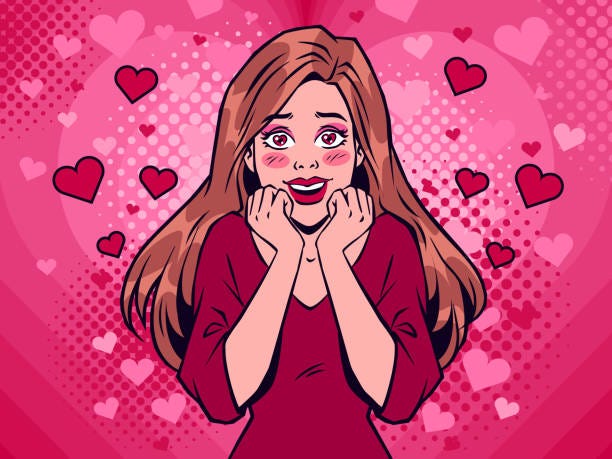A few weeks ago, I read How to leave a parasocial relationship by
over on . A parasocial relationship is one-sided, where the other party doesn’t know anything about their ‘admirer’, shall we say? For the likes of celebrities and superstars, there’s an awareness of a general audience, reader, or listeners, but on an individual level they don’t know that you even exist at all.The piece is a conversation between Kate and Lucy Blakiston, from Shit You Should Care About, focusing on YouTuber Emma Chamberlain. Recently several fans have been upset by changes in her choice to favour more philosophical content, feeling as though her lack of a college education disqualifies her from being able to discuss such things. It begs the question that if you continue to engage with celebrities or influencers when their content no longer resonates, can they ever be at fault?
I wasn’t familiar with the term ‘parasocial relationship’ until this, despite the fact I and pretty much everyone else have had one thanks to the media-obsessed society we find ourselves in. On the face of it, parasocial relationships all sound a bit creepy if not borderline cyber-stalker-y. But if we are to accept there is a spectrum here, then parasocial relationships are also the first crush we ever had on someone from our favourite TV show. The one whose photos you cut out of magazines and stuck on the pinboard on your bedroom wall. This is purely an example. Hypothetical. I have never done this. Ever. Never.
It’s nice to have someone to idolise. To look up to and admire.
At the other end of the scale, TV shows like Swarm explore the potential dangers and extremes of fandom culture. The dark comedy-thriller is loosely based around Beyoncé’s ‘BeyHive’. The term is self-appointed by Beyoncé fans as a way to highlight themselves as passionate and dedicated. Swarm follows the story of Dre, an obsessed fan who becomes increasingly violent… The reality is that parasocial relationships can certainly become an all-consuming slippery slope. One that threatens to take over your life and for what? A person you’ve likely never met or ever will.
When it comes to Emma Chamberlain discussing topics that she isn’t deemed to be knowledgeable on, I sit somewhere on the fence in terms of whether I care or not. I do agree that someone, particularly a YouTuber whose content is incredibly conversational and much less polished or curated, is allowed to break free from their own mould and change their interests and likes. It’s human nature. We’re constantly developing and evolving as people and as such, things we’re influenced or inspired by can change over time. It’s part and parcel of influencer and celebrity culture, where individuals are praised for candour and being their authentic selves, as opposed to an actor or a singer whose performance and talent are the focal point.
Equally, I could understand that if a particular niche of content is what garnered the initial interest of fans and propelled someone into the fame stratosphere, for them to take a new direction may come with a sense of disloyalty. Particularly if the new content no longer appeals. But hey, now they have a big enough platform to talk about whatever they like they no longer need you! Ouch.
I’m also very cautious when it comes to allowing celebrities or influencers to use their platform to push a particular agenda. I’m torn entirely. Awareness of certain topics can be vital to spread the word and social media has created a (seemingly) more democratic, quicker and far-reaching way to achieve this. However, should anyone with a following really be given licence to talk about topics they know nothing about? Surely we’re in danger of spreading misinformation and bias or opinion if we expect too much of a layperson to inform us of worldly current affairs by mindlessly reposting things without knowing their stance or why it matters.
I trust that many people, maybe even most, use their platforms for good. That when changing course from usual content to pressing socio-cultural or economic issues, they’ll do some basic research at the very least. Either way, I still feel apprehensive.
Parasocial relationships have the power to leave us hanging on every word someone says. Should one single person have that much power?




I've been thinking on the whole parasocial phenomenon in relation to Substack, Mary. It's so interesting to have (for the first time, really) developed relationships with strangers in an online space. People that I may never meet, but who I feel intimately connected with. There's a sliding scale. Some I feel are my peers here, which I think is a different thing when we come to know one another through our shared work and an appreciation of what we do, but others who have a bigger profile and, though friendly, are unlikely to become my IRL pal. Thanks for mulling this over, and wishing you a lovely festive. x